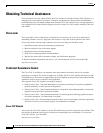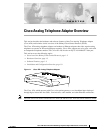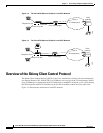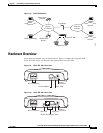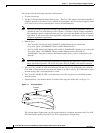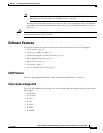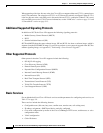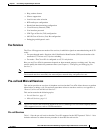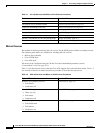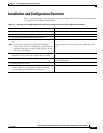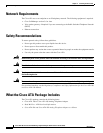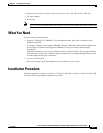
1-6
Cisco ATA 186 and Cisco ATA 188 Analog Telephone Adaptor Administrator’s Guide (SCCP)
OL-3141-01
Chapter1 Cisco Analog Telephone Adaptor Overview
Software Features
When operating with a low-bit-rate codec, the Cisco ATA can support either two G.723.1 connections or
one G.729 connection. The selection of G.723.1 or G.729 must be statically configured. When G.723.1
is the low-bit-rate codec, each FXS port is allocated with one G.723.1 connection. When G.729 is used,
only one FXS port can use G.729. For more information, see the “LBRCodec” section on page 5-11 and
“ConnectMode” section on page 5-13.
Additional Supported Signaling Protocols
In addition to SCCP, the Cisco ATA supports the following signaling protocols:
• Media Gateway Control Protocol (MGCP)
• H.323
• Session Initiation Protocol (SIP)
SCCP and MGCP share the same software image. SIP and H.323 also share a software image, which is
separate from the SCCP/MGCP image. If you wish to perform a cross-protocol upgrade from SCCP to
another signaling image, see Appendix E, “Performing a Cross-Protocol Upgrade.”
Other Supported Protocols
Other protocols that the Cisco ATA supports include the following:
• 802.1Q VLAN tagging
• Cisco Discovery Protocol (CDP)
• Domain Name System (DNS)
• Dynamic Host Configuration Protocol (DHCP)
• Internet Control Message Protocol (ICMP)
• Internet Protocol (IP)
• Real-Time Transport Protocol (RTP)
• Transmission Control Protocol (TCP)
• Trivial File Transfer Protocol (TFTP)
• User Datagram Protocol (UDP)
Basic Services
For an alphabetical list of Cisco ATA basic services and the parameters for configuring each service, see
Table 3-5 on page 3-8.
These services include the following features:
• Configurable tone (dial tone, busy tone, confirm tone, reorder tone, call waiting tone)
• IP address assignment—DHCP-provided or statically configured
• Cisco ATA configuration by means of the Cisco CallManager TFTP server, web browser, or voice
configuration menu.
• VLAN configuration
• Caller ID format



